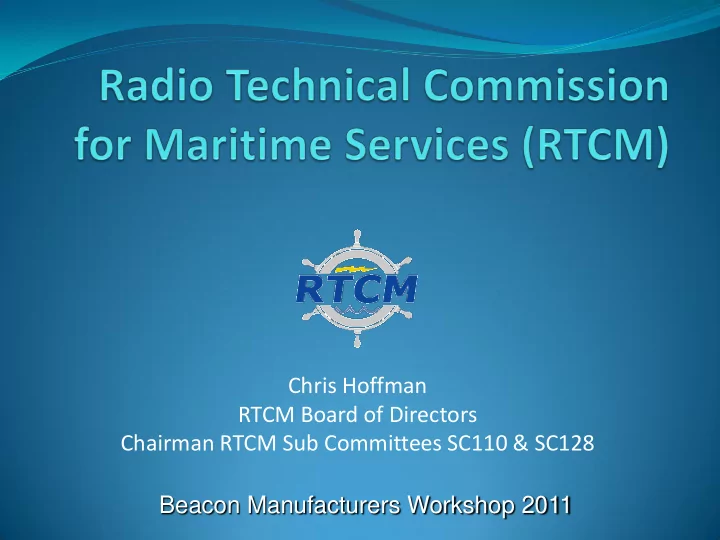

Chris Hoffman RTCM Board of Directors Chairman RTCM Sub Committees SC110 & SC128 Beacon Manufacturers Workshop 2011
RTCM Overview RTCM is an international non-profit scientific, professional and educational organization Members are both government and non-government organizations Established in 1947 as a U.S. government advisory organization Now an independent organization with members from all over the world Headquartered in Arlington VA, (Washington DC)
RTCM Main Activities RTCMs main area of activity is related to commercial shipping and navigation and radiocommunications systems for these vessels It also works in other areas when mandated such as Differential GPS and Terrestrial Satellite Distress Alerting RTCMs main role is in developing standards, but it also plays a major part in national and international committees, information dissemination to its members and advising on legislation and regulatory changes
RTCM SC110 Sub-Committee Emergency Beacons (EPIRBs and PLBs) Update
Beacon Manufacturers Workshop 2011 RTCM Special Committee SC110 on Emergency Beacons SC110’s primary role is to develop and maintain standards for Emergency Beacons – 406 MHz EPIRBs, PLBs and Ship Security Alert Systems (SSAS) It is also involved in: The work of SC119 on Marine Survivor Locator Devices The work of SC128 on Satellite Emergency Notification Devices A joint committee with SC101 on VHF DSC GPS Hand Portable Radios Considering new technology, ideas and other related matters of interest to its members e.g. AIS EPIRB, C/S MEOSAR system RTCM also plays a very active role in the work of Cospas-Sarsat and in particular in its yearly Joint Committee (JC) meetings We also seem to be discussing an increasing number of ELT matters 5
Beacon Manufacturers Workshop 2011 Current SC110 Main Work Areas Participating in the Cospas-Sarsat JC-25 Meeting Developing input towards Second Generation Beacon Standards for MEOSAR Keeping abreast of work in other bodies e.g. IMO and ITU Updating the RTCM 406 MHz EPIRB Standard, including adding new Ergonomics requirements and GPS Simulator Testing Working towards an AIS EPIRB standard Considering including AIS in PLBs Working with NOAA on Beacon Registration Issues Considering ELT issues – External Power, Antennas, Batteries Battery Life Discussions 6
Beacon Manufacturers Workshop 2011 PLB Status Current Standard RTCM 11010.2 Published July 2008 Amendment 1 to above Std Published Aug 2010 – Annex G Internal Navigation Device Test Methods and Test Procedures GPS PC Simulator TEST SET UP Amplifier (if required) Attenuator (if required) Phase center location Anechoic Chamber Bcn Tester PLB Non-conducting Plinth GPS Re-Radiating Antenna Standard Gain Horn Note – Upper Surface of PLB above GPS Receiver Antenna to be on phase center line Spectrum Analyzer 7
Beacon Manufacturers Workshop 2011 EPIRB Status Current standard RTCM 11000.2 published June 2002 RTCM updating standard to bring it into line with latest issue of IEC 61097-2 Updated standard will only address differences from the IEC standard Internal Navigation Device Timing GNSS Self Test Inadvertent Activation Incorrect Mounting Ergonomics Requirements and Tests Cold Thermal Shock Tests Testing internal GPS Receivers using GPS Simulators 8
Beacon Manufacturers Workshop 2011 EPIRB Standard Changes Key areas of change relate to reducing false alerts and making it easier to carry the EPIRB to a liferaft 9
Beacon Manufacturers Workshop 2011 Battery Life Discussions T.007 A.2.3 Operating Lifetime at Minimum Temperature i. the depletion in battery power resulting from normal battery loss of energy due to battery ageing over the rated life of the battery pack; at room temperature Battery Storage Temperature Typical Annual Battery Capacity Loss -20 C 0.1% 0 C 0.3% 20 C (Ambient) 1% 40 C 2.8% 60 C 7.1% 10
RTCM SC128 Sub-Committee Satellite Emergency Notification Devices (SEND)
Beacon Manufacturers Workshop 2011 RTCM SC128 SEND OVERVIEW Committee set up in Q4 2008, at the request of the USCG to establish standards for commercial satellite emergency notification and locating devices, abbreviated to SENDs by the committee SC128 is working closely with the US National Search And Rescue Committee (NSARC) who have formed a Working Group to look into communications interfaces with the emergency services and with the RTCM ProTECTS Alliance SC128 is drawing expertise and data from SC110 406 MHz PLB work SC128 first met Q1 2009 and has typically meet quarterly SC128 SEND members include: USCG USAF NOAA NASA FCC NSS Canada Globalstar Inmarsat Iridium Manufacturers Consumer Advocate
Beacon Manufacturers Workshop 2011 RTCM SC128 SEND STANDARD Has developed a generic standard for SEND’s (both one way and two way comms devices) Standard addresses: Controls Indicators Operation General Construction Technical Characteristics Environmental and Other Tests Standard will not cover technical features of satellite communications (e.g. Tx Power, Frequency, Modulation), the satellite provider is responsible for this area Standard will not address non-distress functionality, except where it impacts the distress alerting function Some back end service requirements are included
Beacon Manufacturers Workshop 2011 RTCM SC128 TYPES OF SEND The standard addresses the following SEND variants: Categories of SEND: Cat 1 SEND which must float Cat 2 SEND which is not required to float Cat 3 Fixed Vehicle Mounted SEND Classes of SEND: Class 1 SEND which operates over the temperature range of -40C to +55C Class 2 SEND which operates over the temperature range of -20C to +55C Thus currently there are 6 possible variants of SENDs NOTE – Excluded from the standard are devices that are not dedicated distress alerting devices that connect to the PSTN (e.g. Satellite pagers and phones)
Beacon Manufacturers Workshop 2011 RTCM SC128 SEND STATUS Current Status CDV resolution meeting held this week. Standard will be published in a few weeks time Future Work It is anticipated that the FCC will adopt the standard and mandate it for SEND devices sold in the US RTCM believes the standard could form the basis for an international standard in this area It is hoped that the USCG will approve SEND devices prior to the FCC adopting the standard into their rules
For further information on RTCM and details of membership and the work of SC110 & SC128 visit www.rtcm.org
Recommend
More recommend